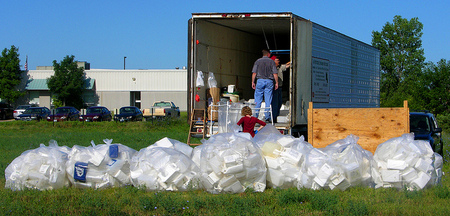
Free Agrichemical Container Recycling August 3 and Residential-Use Pesticide Container Recycling Tips
Kane County Recycling Coordinator Clair Ryan 7/26/2022 8:00AM
The Illinois Department of Agriculture is sponsoring its annual agrichemical container recycling collection in Kane County on Wednesday, August 3 from 1 – 3 p.m.
The collection is hosted by CHS, Inc. and is located at 2N374 Meredith Road, Maple Park 60151.
The program will accept agrichemical containers both large and small as long as they are made from plastic #2, a.k.a. high density polyethylene. Please note that the containers must be empty and cleaned, either by triple-rinsing or high-pressure rinsing. The full container preparation instructions can be found on the state Agrichemical Recycling Program website.
Over its 20-year history, the program has prevented over 1.6 million pounds of plastic from being landfilled.
Did you know that fully empty and cleaned plastic containers used in DIY/home applications can be recycled curbside? Here are the steps to take before putting a pesticide container in the recycle bin:
1. Make sure the container is truly empty. Containers with unwanted pesticide should be disposed of through a household hazardous waste program.
2. Clean the container as soon as the product is used up. Dried residuals can be difficult to clean out.
3. Fill the container about ¼ full with water, replace the cap and shake.
4. Apply the rinse water to the same area the pesticide was applied too (e.g., if you empty an insecticide container spraying your rose bushes for aphids, then pour the rinse water on the rose bushes too). Never pour pesticide rinse water on an impervious surface (driveway, sidewalk, road, etc.), down a home drain (sink, toilet, bathtub, floor drain, etc.) or into a storm drain.
5. Repeat steps 3 and 4 twice more to ensure the container is really clean (this is called triple rinsing).
6. If the product was “ready to use” with an application wand and nozzle attached to the bottle, cut this wand off and place in the trash before recycling the bottle.
7. Place the clean container in the recycling bin with the cap off. Caps for plastic bottles that used to contain non-hazardous material like drinks or shampoo can be left on, but for pesticides, it’s important for the waste hauler and recycling plant workers to be able to see that the container is both empty and clean.
On a final note, the most environmentally friendly action of all is to reduce or eliminate the use of pesticides on home gardens as much as possible, as they inevitably have off-target impacts on rivers and streams, insects and wildlife.
The Japanese beetles that attack my roses every summer get picked off and dipped in a couple of inches of water with dish soap - no triple rinse required!

